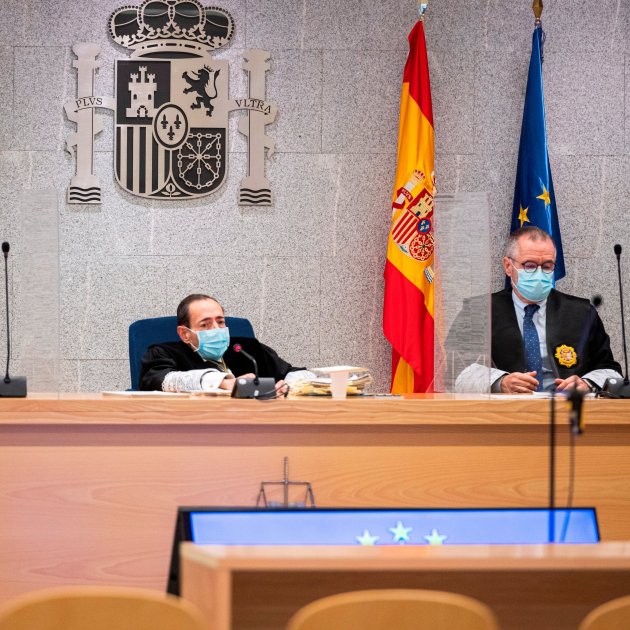Presiding judge Félix Alonso Guevara has rejected the request of defence lawyers in the 2017 Catalonia terror attacks trial to call an additional witness: former Spanish police commissioner José Manuel Villarejo, alleged "dirty ops" director, who is currently in pretrial detention, and who told another trial last week that he has material information about this one.
Villarejo took to the stand last Friday to defend himself from an accusation of slandering the former chief of the Spanish intelligence service (CNI), Félix Sanz Roldán, and in the course of his testimony said a source had warned him of the risk of a terrorist attack in Barcelona. Judge Guevara responded that "what this gentleman or any other gentleman says does not affect the trial."
The tone at Monday's resumption of a trial which began two months ago was marked, precisely, by the surprising statement which Villarejo made last week, fueling one of the hypotheses that has been hanging over the case since day one: that the CNI failed to provide the information it knew to the Catalan Mossos police and that the secret service itself had connections with the imam, the mastermind behind the terror attacks who supposedly perished in a bomb-making accident.
The defence lawyers made their request to call José Manuel Villarejo on Monday morning, "based on his testimony in the [slander case], in which he commented that he was investigating the imam Es Satty and he considered it proven that he was working for the Spanish CNI and that afterwards he was a double agent for the Moroccan intelligence service."
The judge's response was to deny the request. "There would have to be an extraordinary revelation for this trial to make a supplementary investigation. And there hasn't been one. And that's it."
Expert witness testimonies
After the break in the Madrid trial caused by the Christmas holidays and the Storm Filomena, it resumed on Monday with testimonies from technical experts.
Investigators from the Mossos d'Esquadra and the National Police believe that the two main defendants in the trial for the August 17th attacks, Driss Oukabir and Mohamed Houli, were part of the jihadist cell and knew of the terrorist group's plans. According to two Mossos and a chief inspector of the National Police, the analysis of conversations, internet searches and other documentary evidence allow them to conclude that both Houli and Oukabir took part in the preparations for the attacks. Specifically, they say that Oukabir played an important role in the group’s logistics in terms of vehicle rental, searches for targets and the acquisition of weapons, money and phones, and that he also became self-indoctrinated.
The first to testify today was an expert from Spain's National Police who coordinated a report on the suspects' electronic devices and use of social media. They also testified that two police officers made intelligence reports on the cell.
A Mossos d'Esquadra expert stated that Houli and Oukabir were "full members of the cell". Mohamed Houli is said to have joined from May 26th, 2017 - after Ramadan - when the older members of the group explained to the younger ones their intentions to attack. "Houli was actively involved in the organization of the attacks," the Mossos say. According to investigators, Houli’s first logistical action was on July 11th with the purchase of a “conspiratorial” SIM card that was found in a mobile device in Alcanar. He also participated in the purchase of explosive material and in the sale of stolen jewellery to finance the attacks.
"Said goodbye to relatives"
As for Driss Oukabir, the Catalan police believe that he joined in mid-2017, but by February 2017 "he was already self-indoctrinating himself to integrate" into the jihadist cell. They also say he “participated actively” through the acquisition, repair and preparation of three phones during his trip to Morocco in early August and the rental of the van used by Younes Abouyaaqoub to attack the Rambla.
Thus, for example, several messaging conversations between Driss and his brother Moussa Oukabir were intercepted, when the former was in Morocco in early August 2017. They seemed to speak in coded language, apparently avoiding the use of certain words. In the conversations Driss made quite a few references to daily Muslim prayers and they also talked about three cell phones he had bought or fixed. The accused also mentioned to his brother that he did not want to return to Catalonia, to the country of the 'kafirs' or "shithead" infidels. According to the police, Driss Oukabir went to Morocco to say goodbye to his relatives before the attacks and for a ritual of spiritual healing.
At various points in these conversations he said, "I'll tell you when I get back." This, according to the police, means that he did not want to comment on some details over the phone and that he was speaking not only to his brother, but also possibly to the rest of the cell. They also talked about a significant amount of money, about 1,000 euros, which was from several people, which he spent all of.
Although Driss missed the plane back on the 13th, he had his family buy a ticket for the next day. On the 16th, his brother Moussa had also just returned from France on a trip, and told his brother Driss to "charge his batteries."
Once the Alcanar house was blown up in the bomb-making explosion on the night of August 16th, Driss expressed doubts about his involvement, but investigators understand that he knew what could have happened in Alcanar and what was being prepared imminently. In fact, he even threatened to confess everything to the Mossos d'Esquadra: "I haven't done anything and I don't plan to go to prison."
